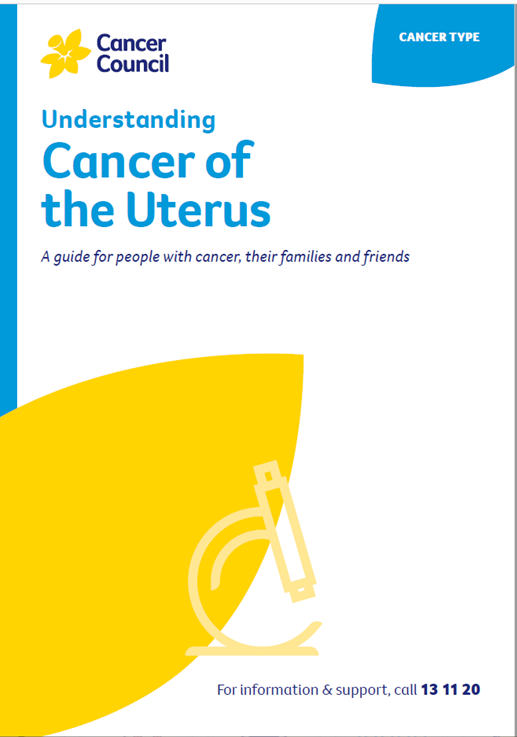- Home
- Cancer of the uterus
- Diagnosing cancer of the uterus
- Staging, grading and prognosis
Staging, grading and prognosis
Understand the staging and prognosis for cancer of the uterus. Discover how staging impacts treatment options and outcomes.
Learn more about:
Overview
Staging is a way to describe the size of the cancer and whether it has spread to other parts of the body. In some cases, these scans can show if the cancer has spread, but it is often not possible to be sure of the stage until after surgery.
Grading describes how the cancer cells look compared with normal cells and estimates how fast the cancer is likely to grow.
Knowing the stage and grade helps your doctors recommend the best treatment for your situation. The tables below show how endometrial cancers are staged and graded. Uterine sarcomas are staged differently, so discuss this with your doctor.
Tests after surgery
Cancer of the uterus is often removed with surgery. The removed tissue is then sent to a laboratory for further testing to find out more about the type and features of the cancer. Some people may also have genetic tests (below) to help doctors decide if any treatment is needed after surgery.
Pathology assessment
The pathologist will check the sample to assess: how deeply the tumour is growing into the uterine wall (myometrial invasion); how quickly the cells are growing (grade); the type of cells that make up the cancer; and whether any lymph nodes contain cancer cells. They will also use special chemicals (called stains) to look for any gene changes in the cancer cells. This is called genomic or molecular testing. The results of these tests help your doctors to work out what types of treatment may be helpful and if further genetic tests may be needed.
Genetic tests
For endometrial cancer, the tissue sample may be checked for inherited gene changes. For example, a small number of endometrial cancers are caused by Lynch syndrome. This is linked to an inherited fault in the genes that help the cell’s DNA repair itself (called deficient mismatch repair or dMMR). People with Lynch syndrome are at increased risk of other cancers, so it’s important for you, your family and your doctors to know about this.
Also, knowing if the tumour contains a faulty gene will help your treatment team decide if further treatment may be needed after surgery.
Find out more about Lynch syndrome at Cancer Council Victoria.
Stages of endometrial cancers
The 4 stages of endometrial cancer may be divided into sub-stages, such as A, B and C, which indicate increasing amounts of tumour.
| stage 1 | The cancer is found only in the uterus. | early or localised cancer |
| stage 2 | The cancer has spread from the uterus to the cervix. | regionalised cancer |
| stage 3 | The cancer has spread beyond the uterus/cervix to the ovaries, fallopian tubes, vagina, or lymph nodes in the pelvis or abdomen. | regionalised cancer |
| stage 4 | The cancer has spread further, to the bladder, bowel or rectum, throughout the abdomen, to other parts of the body such as the bones or lung, or to lymph nodes in the groin. | metastatic or advanced cancer |
Grades of endometrial cancers
| grade 1 (low grade) | The cancer cells look slightly abnormal and are slow growing. |
| grade 2 (moderate grade) | The cancer cells look moderately abnormal and are growing at a moderate rate. |
| grade 3 (high grade) | The cancer cells look more abnormal and tend to be faster growing than lower-grade cancers. |
Prognosis
Prognosis means the expected outcome of a disease. You may wish to discuss your prognosis with your doctor, but it is not possible for anyone to predict the exact course of the disease. Instead, your doctor can give you an idea about the general outlook for people with the same type and stage of cancer of the uterus.
To work out your prognosis, your doctor will consider test results, the type of cancer of the uterus, the rate and depth of tumour growth, the likelihood of response to treatment, and factors such as your age, level of fitness and medical history.
In general, the earlier cancer of the uterus is diagnosed, the better the prognosis. Most early-stage cancers of the uterus have high survival rates. If cancer is found after it has spread to other parts of the body (advanced cancer), the prognosis is not as good and there is a higher chance of the cancer coming back after treatment or continuing to grow.
→ READ MORE: Your health care team
Podcast: Tests and Cancer
Listen to more episodes of our podcast for people affected by cancer
More resources
All updated content has been clinically reviewed by Professor Alison Brand, Clinical Professor, The University of Sydney and Director, Department of Gynaecological Oncology, Westmead Hospital, NSW. This edition is based on the previous edition, which was reviewed by the following panel: A/Prof Orla McNally, Consultant Gynaecological Oncologist, Director Oncology/Dysplasia, Royal Women’s Hospital, Honorary Clinical Associate Professor, University of Melbourne, and Director of Gynaecology Tumour Stream, Victorian Comprehensive Cancer Centre, VIC; A/Prof Yoland Antill, Medical Oncologist, Peninsula Health, Parkville Familial Cancer Centre, Cabrini Health and Monash University, VIC; Grace Guerzoni, Consumer; Zeina Hayes, 13 11 20 Consultant, Cancer Council Victoria; Bronwyn Jennings, Gynaecology Oncology Clinical Nurse Consultant, Mater Hospital Brisbane, QLD; A/Prof Christopher Milross, Director of Mission and Radiation Oncologist, Chris O’Brien Lifehouse, NSW; Mariad O’Gorman, Clinical Psychologist, Liverpool Cancer Therapy Centre and Bankstown Cancer Centre, NSW.
View the Cancer Council NSW editorial policy.
View all publications or call 13 11 20 for free printed copies.

